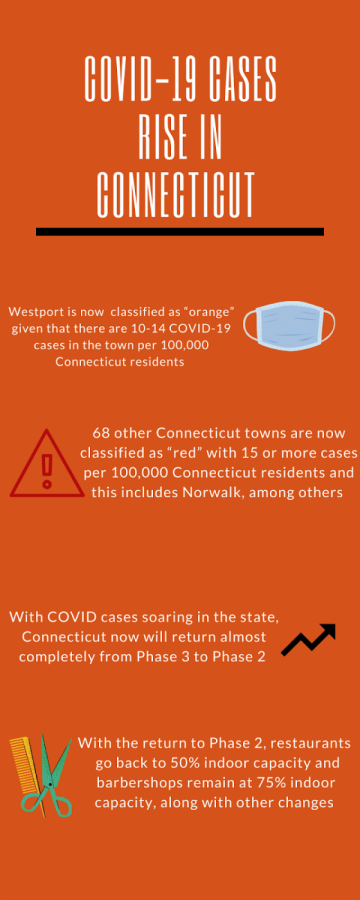Graphic by Finnegan Courtney ’23
With Westport now classified as an “orange” town, capacity will revert back to Phase 2.1 regulations as opposed to Phase 3.
Westport under COVID-19 “orange alert,” returns to Phase 2.1
Natalie Bandura '22, Editor In-Chief
Westport received an orange color coding on the Connecticut COVID-19 Data Tracker map of average daily COVID-19 cases per 100,000 residents on Nov. 5. Following a statement from First Selectman Jim Marpe, the town is rolling back from Phase 3 reopenings and returning to a modified Phase 2.1 plan.
In Connecticut’s color-coded four-tier COVID-19 alert system, a “red alert” entails 15 or more cases per 100,000 residents, an “orange alert” ranges between 10 to 14 cases, a “yellow alert” ranges between five to 10 cases and a “grey alert” is for communities with less than five cases per 100,000 residents. Bordering towns Norwalk and Stamford, along with 68 others, are designated as red.
“The colors are meant to provide communities an accurate account of the prevalence of COVID-19 so that the appropriate personal precautions can be managed,” Marpe said in a statement on Nov. 5. “Given this status, the CT Department of Public Health recommends adherence to the rules of phase 2.1.”
Under the Phase 2.1 plan, restaurants will return to 50% capacity and will be required to close by 9:30 except for food takeout or delivery services. Additionally, personal services including hair salons and barber shops will be open at 75% capacity, and event venues will be capped at 25 people indoors and 50 outdoors. Performing arts venues and movie theatres will also be capped at 100 people and religious gatherings will be limited to 50% capacity.
Some students feel that the orange rating and withdrawal back into Phase 2 is a result of poor public adherence to safety regulations.
“I’m a little shocked because I thought we were doing pretty well all around,” Paige Toglia ’23 said. “But it seems that people may not be following the regulations put in place as closely as we hoped, so we might be going into a relapse.”
Some students feel concerned about a potential future school closure and fear that Westport will no longer be able to contain COVID-19 cases due to high infection rates in neighboring towns.
“I think it’s worrying, and I won’t be surprised if school closes down again,” Gleb Syomichev ’23 said. “Although, [with] how the school is handling things at the moment, I still feel safe.”
Inklings News • Copyright 2025 • FLEX WordPress Theme by SNO • Log in
